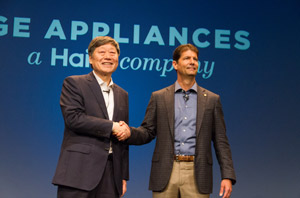
HAIER: Acquisition of GE Appliances is completed
China’s largest producer of household goods, Haier (Qingdao; www.haier.net), has completed the acquisition of GE Appliances from General Electric (GE, Fairfield, Connecticut / USA; www.ge.com). The deal was initially announced in January 2016 – see Plasteurope.com of 19.01.2016.
GE Appliances will continue to be headquartered in Louisville, Kentucky / USA and operated independently under the day-to-day direction of its present management team. A board of directors, with representatives from the senior leadership teams of Haier and GE Appliances, and two independent directors, will help guide the strategy and operations of the business.
About Haier:
Haier Group Profile
Established in 1984, Haier is the world’s No. 1 major appliance brand. It has transformed from an enterprise that manufactures household appliances to a platform that incubates entrepreneurs for the whole society. In the Internet age, Haier aims to become a Networked Enterprise which overturns its self-contained enclosed system and fits into the Internet as a node that can connect various resources, with a view to building post-e-commerce ecosystems based on user value interaction for co-creation and winning together to add value for all stakeholders.
To forge itself into a real Networked Enterprise, Haier has carried out self-disruption in six aspects: strategies, organization, employees, users, compensation and management, so as to create a dynamic cycle system and accelerate the Internet transformation. Strategically, Haier establishes a user-centered ecosystem for co-creation and winning together to add value for all stakeholders; in the organizational structure, Haier changes the traditional enclosed system into an open node distributed on the Internet and replaces hierarchy with a networked organization. In this process, Haier transforms its staff from employees and passive performers to entrepreneurs and dynamic partners, aiming to meet the individualized needs of users by means of community featuring ecosystems with best experience. In its compensation mechanism, “pay by users” has superseded “pay by the enterprise”, driving employees to become entrepreneurs who create value for users while realizing their own value; In the management innovation, Haier has achieved self-evolution of leading goals through the exploration into nonlinear management.
On Haier’s entrepreneurial platform there are two listed companies: Qingdao Haier (600690.SH) and Haier Electronics (01169.HK). The main focus of Haier Group is the innovation on three platforms: white household appliance, investment incubation and finance holding platforms.
• White household appliance platform: focus on interconnected factory’s interface with the customization from Micronet system. Drive product iteration with user resources with man-machine dialog and interconnection of Internet appliance.
• Investment incubation platform: With “Integrity First” as the core principle and community as the basic unit, build tailored reservation platform and develop user resources with mutual trust and lasting relationship, driving transformation and upgrade of microenterprises via capital marketization throughout all processes.
• Finance holding platform: Relying on the huge user resources from the Internet and Haier’s industry advantages, develop a value addition system of shared success for all stakeholders.
The three platforms can provide a series of entrepreneurial resources, including the manufacture, logistics, VC investment and incubation, human capital and other systems for the entrepreneurs, enabling them to achieve innovative growth by using resources in Haier’s ecosystems.
Through its exploration into the Internet Model, Haier Group has achieved steady growth. In 2015, Haier achieved a global turnover of 188.7 billion yuan with a compound growth rate of 6% over the past decade, and a total profit of 18 billion yuan with a 20% year-on-year growth rate and 30% compound growth rate over the past decade, 5 times that in revenue. The online trade volume reached 157.7 billion yuan, a year-on-year growth of nearly 200%. With the rapid development of Internet finance, the trade volume on the Internet platform totaled over 70 billion yuan. By the end of 2015, Haier’s platforms have attracted over 4,700 first-rate external resources, 3 billion yuan of VC fund, 1,330 VC institutions and 103 incubators, setting the stage for 1,160 projects. Over 3,800 node microenterprises and nearly one million microstores on Haier’s platforms are socializing their capital and human resources. More than 100 microenterprises boast an annual revenue of over 100 million yuan, and 22 have introduced VC, and 12 are valued at over 100 million yuan. Due to Haier’s transformation through decentralization, disintermediation and removing the “insulated wall”, the employees have decreased from the highest 110,000 to less than 60,000, but Haier’s platforms have offered over 1 million jobs for the whole society.
Haier’s Internet transformation is based on the exploration into the “win-win model of Rendanheyi”. Now the model has been iterated and upgraded to “Rendanheyi 2.0 – an ecosystem for co-creation and winning together”, in which, the definitions of “ren” and “dan” have changed from “employees” to “stakeholders” and from “user value” to “user resources” respectively, and “win-win” has been upgraded to “all-win”. The ultimate goal is to add value for all stakeholders in the ecosystem. Having solved many management problems in the Internet age, this management model has been recognized by many world-famous business schools and management scholars, who, based on their long-term research, conclude that Haier’s exploration is leading-edge and moving toward a correct direction. Harvard Business School and Wharton School of the University of Pennsylvania have listed Haier’s practice in their case library for teaching and research.
Haier’s model innovation has not only been acknowledged by authoritative experts, but also verified by practical tests. In 2011, Haier announced the acquisition of Sanyo’s white goods business in Japan and Southeast Asia. In 2012, Haier completed the purchase of New Zealand’s iconic home appliances company Fisher & Paykel Appliances (F&P). On January 15, 2016, Haier’s globalization opened up a “historic page” – Haier signed a memorandum of strategic cooperation with GE to integrate GE’s home appliances business, which set not only a new example for business cooperation between large Chinese and US enterprises, but also a new alliance model that rises above price-based trading. Haier’s global brands include Haier, Casarte, Goodaymart, AQUA, Fisher & Paykel and Leader, which bring best user experience from different fields.













